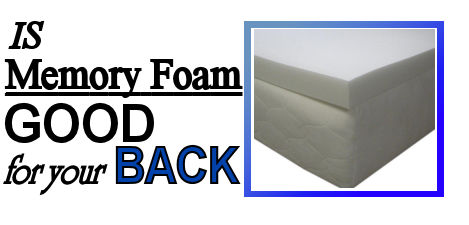Mattresses
Is Memory Foam Good for Your Back?
Memory foam may or may not help, depending on your preference. Like most sleep products, mattress comfort varies from person to person. Evidence suggests that sleeping on memory foam offers many orthopedic benefits, though personal preference plays a significant role. Factors such as the age and quality of the mattress can also affect the outcome. Memory foam can be beneficial for your back, provided it meets certain criteria. The most important thing is that your mattress supports proper spinal alignment, which is essential for pain relief and overall comfort.
- How Memory Foam Works: As you lie on a memory foam mattress, it responds to the weight and heat of your body. A contouring effect cradles your body reducing pressure points. When sleeping on your side, hips and shoulders sink in and your body is more evenly supported. The adaptive support provides more even body weight distribution. Upon rising and removing body heat and weight, the memory foam material slowly returns to its pre-contouring state.
- What the Professionals Say: Chiropractic professionals have performed studies to learn more about how sleep affects back pain and alignment. One thing they have learned is that by supporting good posture during sleep, you can develop better daytime posture. The opposite is true as well; poor sleep posture can cause back pain. Better posture equals less pain so the trick is to improve posture at night. Hybrid models that incorporate memory foam as well as other materials might be the best bet. Soft contouring foam encases the body and the denser under materials keep it from sinking too much. More dense memory foam can be used in the same way.
- Firmness and Back Pain: How firm a mattress is can affect is memory foam good for back alignment. According to Chiropractic Economics, a medium-firm mattress or firm mattress may reduce spinal stress. Memory foam density and firmness is noted by pounds per cubic foot. High density foam is firm, and includes any memory foam marked as 6lbs per cubic foot or higher. Medium has a 4-5lb range and soft firmness is 3 pounds/cubic foot.
- What Memory Foam Does Not Do for Sleep: Finding a mattress that will improve sleep quality is important. Memory foam is one of many types of mattress that can help. However, many Americans struggle with sleep disorders. While memory foam might help alleviate some back pain, it is not a one size fits all solution for improved sleep. For example, a memory foam sleep surface cannot help with sleep apnea or other breathing disorders causing sleep issues.
Lifespan
Mattress age and mattress quality makes a difference. The recommended useful life of a mattress is 8 years. After 8 years, memory foam mattresses lose 16.2% of their original resiliency. This can lead to unsupportive sagging. Lower quality memory foam mattresses can deteriorate quicker, putting undue stress on back muscles. The end result can be misalignment of the back. Is memory foam good for your back when it is old? The answer is no. Mattresses last a long time, but they aren’t meant to last forever.
Sources:
https://www.ncbi.nlm.nih.gov/pmc/articles/PMC2647070/pdf/main.pdf
chiroeco.com/chiropractic-mattress/
© 2025 Rest Right Mattress. All Rights Reserved.


